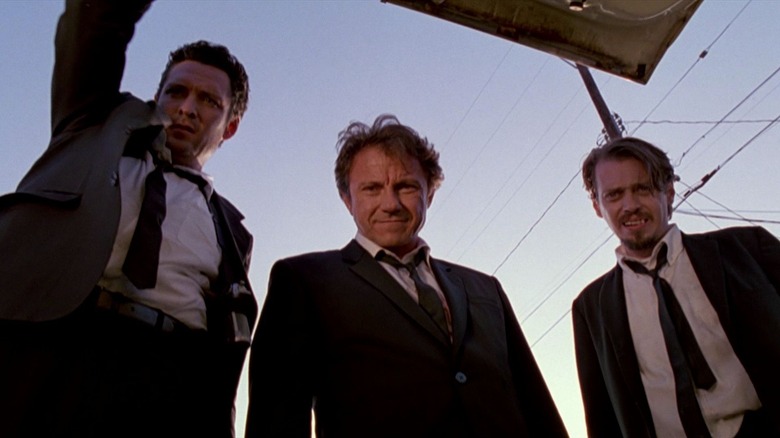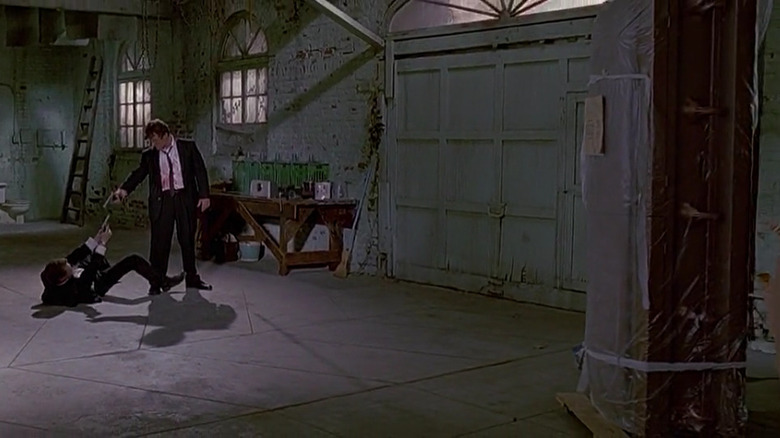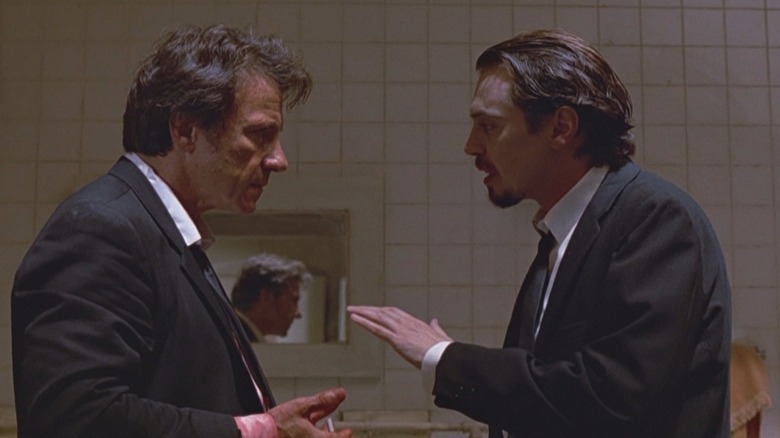Quentin Tarantino Had Trouble Selling Reservoir Dogs' One-Room Setting
If there's one evergreen truth about Hollywood, it's that breaking into the film business is never easy. There's always a catch-22 involved, especially for first-time filmmakers who face an endless revolving door of "I know he can get the job, but can he do the job?"
Assuming one can get through that conundrum, there's the matter of convincing a studio (or investors of some sort) that your movie can make its money back. It's the reason why so many green directors gravitate toward the horror genre for their debut film, given that horror is a perennial box-office draw.
Quentin Tarantino, being a brash artist from the get-go, did not take such a tried-and-true route to the big screen. His first feature film, "Reservoir Dogs," is a multi-character crime drama that pushed the envelope of language, violence, and structure in 1992, that last point confusing Hollywood in particular. One element Tarantino insisted on to keep costs and logistics down is the film's one-room setting, and it turned out to be that aspect that became one of the biggest hurdles in getting "Reservoir Dogs" made at all.
'Trust me, it'll be cinematic'
Hollywood has a long, proud history of adapting stage plays to the screen. For example, here's a fun fact: the original 1931 Universal versions of "Dracula" and "Frankenstein" were largely based on stage versions of the classic novels rather than the novels alone!
Still, this proven history was apparently no help to Tarantino in getting "Reservoir Dogs" off the ground. As he told Film Comment in 1994, the film's clear relationship to theatricality was an issue:
"That was actually a problem [when] trying to get the film made. People would read it and go, 'Well, this isn't a movie, this is a play, why don't you try and do it in an Equity Waiver house?' I was like, 'No, no, no, trust me, it'll be cinematic.' I don't like most film versions of plays, but the reason I had it all take place in that one room was because I figured that would be the easiest way to shoot something."
Anyone who's seen "Reservoir Dogs" knows that it hardly suffers from the stifling qualities that some stage play movie adaptations fall prey to. The Mr. Orange sequence alone proves that Tarantino wasn't about to merely set up a master shot and let the actors run the show themselves. Moving the camera was always part of the plan, as Tarantino pointed out that "the most important thing was that it be cinematic."
Tarantino keeps the film's theatricality in mind
That being said, the filmmaker was certainly aware of the theatricality inherent within "Reservoir Dogs," and sought to keep that aspect of it alive throughout. As he explained:
"One of the things I get a big kick out of in 'Reservoir Dogs' is that it plays with theatrical elements in a cinematic form — it is contained, the tension isn't dissipated, it's supposed to mount, the characters aren't able to leave, and the whole movie's definitely performance-driven."
One of the most playfully clever elements in "Reservoir Dogs" is the way the characters are literally and figuratively roleplaying, taking on new names and, in some cases, new personalities in order to achieve their goals. Tarantino doesn't make the movie's theatricality subtle, either, having Mr. Orange (Tim Roth), who is really a cop going undercover within a team of thieves, literally rehearsing his "character" beforehand.
Tarantino's entire body of work has a theatricality to it, and his movies are, as he put it, "cut to the rhythm of performance" more than anything else. While he's never produced a play proper, he has penned several books to date and has apparently written a stage play version of "Once Upon a Time In Hollywood." What's more, "Reservoir Dogs" itself has subsequently been adapted to the stage in numerous ways, including a gender-flipped version.
As Tarantino proved by actually making "Reservoir Dogs," the characters and story are more than malleable and vibrant enough to grow beyond the confines of one single room.


